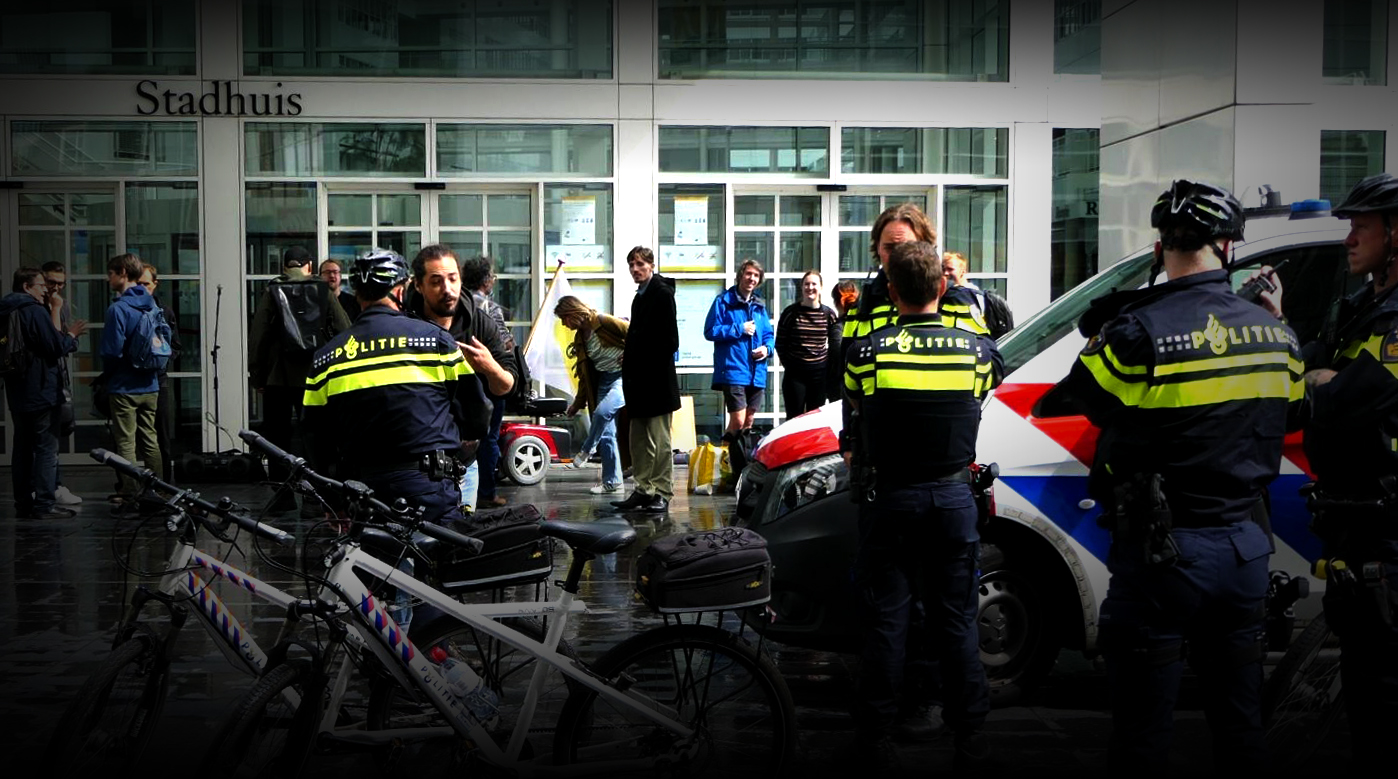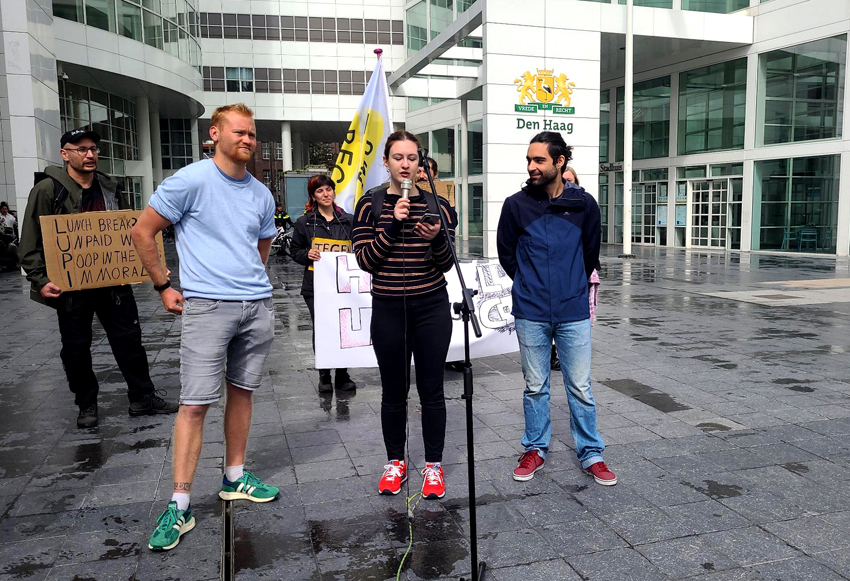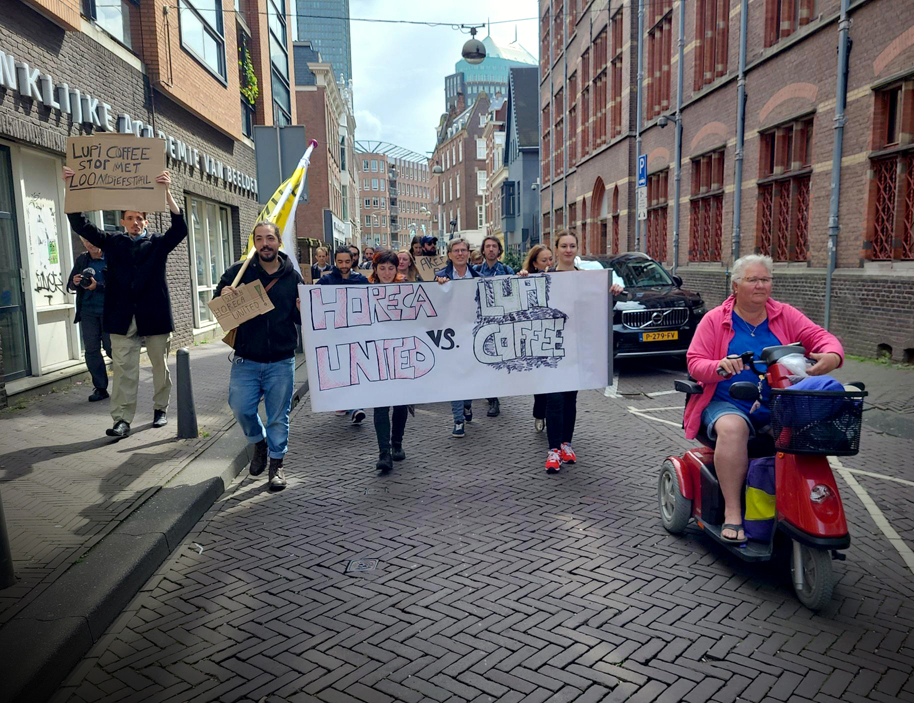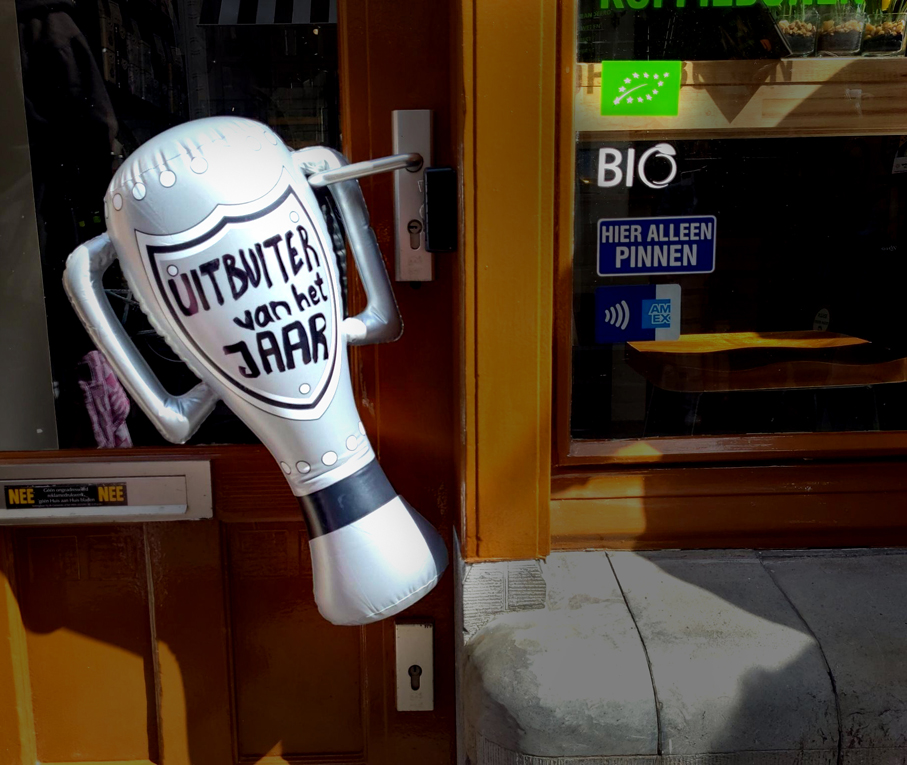There is a schism in political activism between direct action and legal action.
Official unions and government bodies usually insist on the legal route as a rule, while we as a grassroots union go for the direct. The strength of direct action is that it grabs public attention, and therefore moves the dispute forward quicker towards negotiation. It can involve things like public outreach, speaking to the press, or demonstrating. Demonstrations are often about more general causes, such as the vital struggles for workers’ rights, women’s rights, or the environment, but it is especially effective for more specific causes such as our ongoing dispute with Lupi Coffee.

On Sunday 27 of August, despite the wet and windy weather, a group of people congregated on the Spuiplein in the Hague. Banners, placards, a boom-box, and all the standard equipment for a demonstration were pulled out of backpacks and shopping bags. The demonstration against Lupi Coffee began with everyone hoping for the best but expecting the least.
The demonstration was organized by the ex-employees and Horeca United jointly.
For Horeca United, the active participation of workers is an essential part of organizing a campaign. It is a powerful answer to those who assume that we have no agency as workers: a direct, unfiltered voice.
In total, 60 participants joined the demonstration. The crowd was a wide mix of participants. Former employees of Lupi Coffee, members and organizers of Horeca United, comrades from Doorbraak, other independent labor organizers, representatives of both the Socialist Party and the Haagse Stadspartij, as well as family members of ex-Lupi employees who were outraged by the shameless treatment of these workers. A notable absence was that of the FNV, who actively distance themselves from workers who speak up.

Three of the ex-employees spoke to the growing group of protesters. Their speech was an accusation not only against Akef, but against all employers who routinely abuse their staff because it is convenient, because they feel untouchable by authority. The speech was also a sharp cry to local and national governments to address the situation in Horeca. Municipalities have always praised and celebrated bosses like Akef, naming them “entrepreneurs” and “self-made men” who bring economic and social value to their cities. In truth, everyone knows what it costs to build these coffee and caviar empires, and they look away when young precarious workers are used as cheap building material.
After the speeches it was time for the protesters to start their march through the center. Chants were being creatively made on the spot and the energy of participants was high. Onlookers were also positive and we received many waves and smiles of support from other hospitality workers serving drinks and food all over the center. One of the chants in the march mentioned the fact that the ex-Lupi workers were forced to use plastic bags instead of the toilet. This story has captured public attention, and reminds us of the sad reports of Amazon workers urinating in bottles during their shifts.

The march through the city center ended at the Postzegelboom. Because of the large number of protesters, a small delegation completed the last step of the demonstration: an Exploiter of the Year Award in the form of an inflatable trophy, which was to be presented to Akef himself.

Sadly, Lupi Coffee chose the easy way out of this confrontation, and closed their business location for the day. On a busy shopping street like Noordeinde, Sunday is a great day for Horeca businesses. Akef’s willingness to lose an entire day of revenue, and to leave his staff without work for the day, is proof of how powerful these brave workers and their campaign have become. Lupi Coffee is unable and unwilling to face public opinion. And no number of lawsuits and empty legal threats can cover the smell of rotten business.
So why don’t we just start a court case against this corrupt boss? This question has been leveled at the workers and at Horeca United repeatedly, in multiple campaigns. Looking at the most high-profile worker organizing cases of the past few years, direct action shines through as an important tool for our communities as workers.
From delivery couriers to Uber drivers and Amazon warehouse workers, naming and shaming employers has applied more pressure than any court case was able to. These very public cases have forced governments to finally address the depressing situation of flex workers (well, sort of). And these victories came from working people who decided they would not hide their misery anymore; working people who decided they would not accept their working conditions as their own fault; working people who have demanded nothing but the obvious.
Bringing our labor conflict to the court can force us to stop sharing our experiences publicly. The courts are sympathetic to the damages a business owner will suffer from pickets. If only the same sympathy could be shown to young workers who are trying to get by.
This demonstration is just one of the steps that have been taken to escalate our response to Lupi’s treatment of its workers.
Previous disputes, and previous experiences organizing against corrupt employers, demonstrate that these employers always have a bigger bark than their bite, relying on intimidation, usually via legal means. This is the case with Mr Akef: he has so far refused to negotiate, instead referring us to his lawyer and paying him to send us long-winded, official-looking, and ultimately toothless legal threats. We will of course continue with our escalation, as it is so obvious that the public is on our side here. Otherwise, the cause would be hidden away in windowless courtrooms, where Akef believes he can feel less insecure about his coming downfall.
We will continue to openly name this employer and his abusive tactics: Hossein Akef. His attempts to stop us with lawsuits and intimidation will not work. This case is now bigger than him or us; it’s about Horeca in the Netherlands. We want this case to encourage more Horeca workers to speak up against their employers, and to connect with each other.